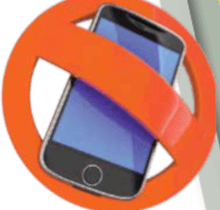Social media and smartphones are fun, but sometimes we find ourselves so absorbed in our technology that we’re not paying attention to what’s around us. We talked to Dr. Ofir Turel, a professor of Information Systems and Decision Sciences at California State University, about why we become hooked to our devices, the science behind addictive behaviors, and how you can curb your mobile phone—and social media—addiction.
 Social media and smartphones are fun, but sometimes we find ourselves so absorbed in our technology that we’re not paying attention to what’s around us. We talked to Dr. Ofir Turel, a professor of Information Systems and Decision Sciences at California State University, about why we become hooked to our devices, the science behind addictive behaviors, and how you can curb your mobile phone—and social media—addiction.
Social media and smartphones are fun, but sometimes we find ourselves so absorbed in our technology that we’re not paying attention to what’s around us. We talked to Dr. Ofir Turel, a professor of Information Systems and Decision Sciences at California State University, about why we become hooked to our devices, the science behind addictive behaviors, and how you can curb your mobile phone—and social media—addiction.
First of all, can we actually become addicted to our smartphones and social media?
Yes, and no. From the brain’s perspective, it doesn’t matter where you get a reward from. What makes you feel happy, excited, or enjoy something, whether it is a behavior or a substance, it came have a similar effect. The easiest way to think about it is like food, especially fatty, sugary food. When we eat the cake, the brain releases dopamine, a neurotransmitter in the rewards center of the brain. So, we eventually desire cake every time we see something that reminds us of cake or we see someone else eating a cake, pass a bakery, or you smell a cake. The same thing happens with social media and other addictive applications like video games. People feel good when surfing social media; when they find new information. So, they crave the use of social media. With teenagers, they’re sitting bored in class, and the only thing they can think about is: When is the next time I’m going to check social media?
Can anyone get addicted to social media?
Not all of us become addicted to social media. It takes another component. There is a self-control system in the brain, or inhibition system. Some of us have better self-control abilities, and others have weaker self-control abilities.
What is it about smartphones, and particularly social media, that gets us hooked?
Social media provides a special type of reward that is called ‘variable rewards’. This is the worst reward that plays with our brain. This is the reward you get in casinos. When you play a roulette or any game at the casino, you don’t know if you’re going to win or lose. There is variability in the schedule of the rewards. In social media, it’s exactly the same thing. You don’t know what you’re going to see in the feed. You don’t know how many likes you’re going to get.
At what point does it cross over from a habit to an addiction?
The crossover is when the habit becomes harmful, and you keep on doing it despite the negative consequences. For example, if you’re checking while social media while driving. Of course, it has negative consequences.
What do we lose by being on our phones all the time, and what can we gain from a break?
If you spend five hours a day on social media, you have less time for homework and it’s very distracting if every 30 seconds you get a text on a group chat. Increased academic performance is a consequence of taking control over one’s behavior. (Basically, if you take control of your bad behaviors, you’ll be more focused and your academic performance will increase/improve.) There are also social benefits and self-image benefits (to taking a break). No one is going to post their worst picture on social media, only when they’re going to parties, and having fun and looking good. This creates an impression that everyone’s life is better. And we see at the national level, an increase of social media use is a part of an increase in depressive symptoms; in reduced self-worth. There are also negative effects on an ability to socialize face-to-face.
What advice do you have for cutting down?
Think of social media and technology as food. i don’t think a total disconnect is reasonable. But too much of it is not good. otherwise the technologies will take over our lives!
Tips for cutting you screen time:
- Turn off push notifications. “It doesn’t create any distractions when I work,” Turel said.
- Uninstall social media apps from your phone. Check your accounts only through your browser, so you have a sign in and consciously think about what you’re doing. “That helps you control your behavior,” Turel said
- Download apps to help with self control. THe app Flipd literally locks you out of your phone when you need to focus. Use it when you’re in class, studying or sleeping.
- Put your phone away when you study. “Put it in another room,” Turel says.
- Use an app that tracks your screen time. It might be a wake-up call. People realize in a week they spent a couple hours on this, and they realize that’s a waste of time, he said. Apps like Moment and Breakfree can help you track your phone usage. Challenge yourself to decrease your screen time a little bit each day.
